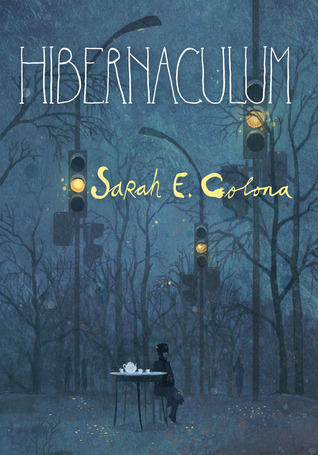Reading Hibernaculum: Sarah Colona’s Traps of Enchantment
(Today’s post is a guest spot from Tasha Cotter, whose first full-length collection of poetry, Some Churches, was published in 2013 with Gold Wake Press. You can find her online at www.tashacotter.com)
 Sarah Colona’s debut collection of poetry, Hibernaculum (Gold Wake Press, 2013) is a collection meant to protect us from winter. Like the title suggests, these poems offer us a kind of winter residence and through their insight and questions, we are safer for having read the collection.
Sarah Colona’s debut collection of poetry, Hibernaculum (Gold Wake Press, 2013) is a collection meant to protect us from winter. Like the title suggests, these poems offer us a kind of winter residence and through their insight and questions, we are safer for having read the collection.
The collection begins with a family’s winter homecoming, but the reader quickly senses there’s an element of unsteadiness—a quality to this gathering that’s darker and more dishonest than one would initially think. And we soon come to see that even amidst the people we know, we are sometimes deeply alone at such gatherings while simultaneously being fed the ideas of others. In this collection, such received wisdom usually comes at a price. Colona says it best when she writes: “A lullaby curse to always love less.”
The Poet is at her best when she is brief. Her gift of precision shines brightest in poems like, “Waxed Lachrymose,” “from her lips/ stilled bees fell.” Throughout the collection there’s an array of poems that touch upon ideas of femininity and womanhood. One passage in particular that speaks to the idea of what Colona is after can be found in her poem, “Memory and Forgetting”:
Always this
Disappearance
This impending loneliness
This is a book of mothers and daughters, of received wisdom, and what we choose to abandon. This is a distinctly feminine voice and these poems are little cautionary tales of fairytales gone wrong—but make no mistake— the speaker is no longer under any illusions. These poems are songs of experience.
Though clearly gifted in using poetic forms, there are many narrative-driven, free-verse poems here as well. Over the course of the book one begins to discern a whimsical quality to this book. I noticed a Grimms fairytale was alluded to and another poem was inspired by Cocteau’s Beauty and the Beast and it’s this poem, “Interlude,” that’s my favorite. Colona infuses the story with her own touch of magic and the story glistens with her touch, creating a new way of seeing a familiar story.
The last section of the book takes on a darker momentum. The speaker’s wry humor seems to have evolved over the course of the book and appears in these poems as being informed by experience.
Mythology is found throughout the collection and creates a bedrock for Colona’s themes of womanhood. Colona writes in the Notes section of the book, “most poems found in the second section have been inspired by the tale of Cupid and Psyche, and its subsequent derivations, which includes Beauty and the Beast.” I appreciated the summoning of these myths—their emergence and the interplay of myth and contemporary experience made this book a uniquely perceptive read, allowing the reader to sense that our own experiences are no less extraordinary or tragic, than the stuff of legends.





